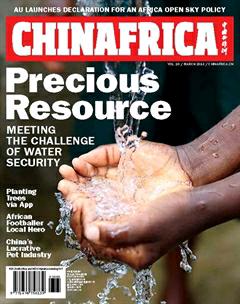Preventing a Water Crisis
water security in Africa has never been as starkly highlighted as the countdown to Day Zero in Cape Town, South Africa, where because of an unprecedented drought, the entire city of about 4 million residents could be without water in July. Water restrictions for all residents are already in place and Day Zero has an activation date of July 9 (at the time of writing). If this catastrophe happens, it would make the famous tourist city that is frequently voted the worlds most beautiful destination, earn another more dubious title - that of the first major city in the world to ever run out of water.
This year World Water Day, which is celebrated on March 22 every year, spotlights“Nature for Water,” exploring nature-based solutions to the water challenges of the 21st century.
World Water Day is designed to inspire people worldwide to learn more about water-related issues and take action, particularly in developing countries. Solutions to drought, floods and water pollution can all be found in nature and those solutions need to be employed expeditiously, especially when considering that three out of every four jobs worldwide are water-dependent. In fact, water shortages and lack of access may limit economic growth in the years to come, according to the 2016 United Nations World Water Development Report: Water and Jobs.
In 2013, Chinese President Xi Jinping said that adapting to nature is vital when addressing the growing urban water crisis. To help the perennial challenge of absorption and runoff of rainwater, one of the initiatives he proposed is the construction of “sponge cities,” which aims to promote water recycling and to protect and restore natural ecosystems.
There are also no shortage of initiatives in Africa, that, while not always strictly adapting to nature, are none the less looking ahead. One example is the cooperation between Namibia and Botswana to share water from the Atlantic Ocean that is then desalinated and pumped inland through a pipeline. This was reaffirmed last month by Botswana President Seretse Khama Ian Khama. In Ghana, meanwhile, the Chinese Government, as part of a concessional grant, signed a contract to construct 1,000 boreholes in six regions across the country over a three-year period.
In its analysis of the economic impact of access to water, a UNESCO report cites numerous studies that show a positive correlation between investments in the water sector and economic growth.
In practical terms, the solution to providing sustainable water security is not that complicated. It also does not require large volumes of funding. Basic water projects that include wells, dams and systems that can make use of rain catchment, are all possible at relatively low cost, and these need to be implemented in rural areas sooner rather than later. The obvious positive spin offs of having access to water literally on tap means rural residents can spend more time on their production and children can be in school and not spending hours a day walking to the nearest water source.
During this years World Water Day, it is important to take cognizance of natures wider role. Despite the UN recognizing water as a fundamental human right in 2010, there is still a widening gap between what is needed and what is delivered. That gap in sustainable use must be spearheaded by the urgent need to protect and preserve water resource and make the planets life blood accessible to all. Without this kind of global commitment, all other efforts to reach UN Sustainable Development Goals and any other long-term goals will just be water under the bridge.

